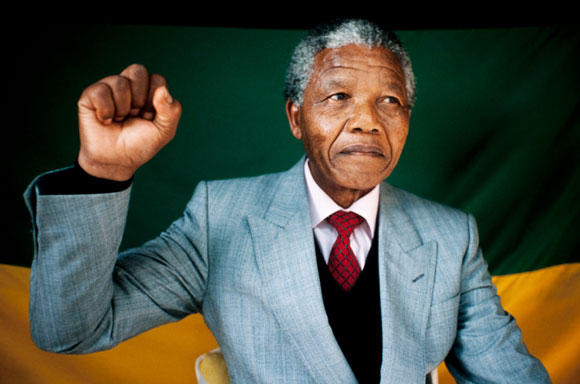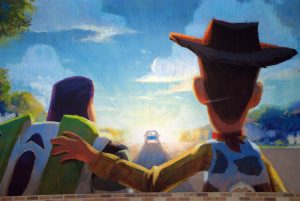Winner of the Spring 2019 StMU History Media Award for
Article with the Best Title
“I have fought against white domination, and I have fought against black domination. I have cherished the ideal of a democratic and free society in which all persons will live together in harmony and with equal opportunities. It is an ideal which I hope to live for and to see realized. But if it needs be, it is an ideal for which I am prepared to die.” 1
The world does not split between only black and white or good and bad. Shades of gray overtake our everyday lives and can make it difficult to navigate ethical dilemmas. Laws and rules do not necessarily make things clearer, nor black and white. Some rules, even those repeated throughout history, may neither be ethical nor positive for people or the societies on which these laws are imposed. If one breaks a law, one can be indicted as a criminal. However, breaking unjust laws provides the philosophical roots of civil disobedience and the motivation of freedom fighters. Nelson Mandela broke the highest law of his land and was tried for treason, not once, but twice. Yet, most recognize Nelson Mandela’s act as justified and he continues to be held in our highest regards, even winning a Nobel Peace Prize. How can one commit treason, be sentenced to life in jail, and still be one of the most beloved leaders and symbols of freedom around the world? Because Nelson Mandela fought for the freedoms of all his people, he fought against an unjust government determined to exploit and dehumanize all people of color, even the indigenous, the legitimate people of the land. Nelson Mandela did not betray the people; he committed treason against an oppressive government for all the right reasons. His world was literally divided into black and white, where white was always lawful, and Africans were always wrong. Mandela fought against laws that had no legitimacy.
On June 12, 1964, the courthouse and the streets around it were filled with those waiting to hear the verdict against Nelson Mandela and eight others during the Rivonia Trials. Judge Quartus de Wet delivered the news that these nine activists were sentenced to life in prison on the charges of conspiracy and sabotage, noting that the actions Mandela and the others committed were “in essence one of high treason” though he did not go as far as to implement the highest form of punishment in accordance with treason.2 The Rivonia Trials were supposed to end Mandela’s fight for justice for South Africa but in fact it only provided him the greatest international stage ever.

Mandela’s first arrest happened in 1952 when the African National Congress (ANC) and National Youth League was being led by Nelson Mandela. He organized a campaign called the “Campaign of Defiance against Unjust Laws,” which was the largest non-violent protest that South Africa had ever seen. The Defiance Campaign was also the first campaign to have all races included in one party in defiance of Apartheid rules by the ANC. 3 Mandela and the other leaders of the Defiance Campaign convinced hordes of volunteers to refuse carrying the books that designated their racial status and to go into the parts of the cities that were forbidden to them. Moreover, the Youth League defied curfews and violated segregation in governmental businesses, such as train stations and post offices. Despite the non-violent nature of the protests, the government became increasingly more worried about the protestors. Members of the Defiance Campaign were frequently arrested for the crimes they committed, but most were minor offenses and were short term prison sentences. This did nothing to stop the influx of volunteers. The numbers rose from 7,000 to 100,000. 4 In December 1952, Mandela was, along with nineteen others, charged for violating the Suppression of Communism Act. The government sentenced them to nine months in jail.
Four years later, in 1956, Mandela was arrested for the second time, during a raid on him home. In his autobiography, “Long Walk to Freedom,” he recalls his arrest that night, asking the arresting officer questions about overpowering him. When the officer said Mandela was playing with fire, he responded with “Playing with fire is my game.” 5” Mandela was put on trial and charged with treason, alongside 155 others, in what would become known as the “Treason Trial.” Four very long years later, the courts eventually found all defendants not guilty. The Treason Trial lasted four years for a number of reasons, mainly the number of people on trial. Defense Lawyer Israel Maisels argued that these individuals were not guilty because “Treason is a crime distinguished by the means used rather than the end” aimed for. 6
In 1960, the ANC was banned and when the trials concluded, Mandela, fearing for his life, fled to the underground, and eventually out of country, first Sudan, then other African countries and London, with a fake passport. During his time under ground and outside the country, the banned ANC gave him permission to gather the forces necessary to create and build an army, essentially taking an organization that treated nonviolence as its core, to a different kind of organization, with a future none could ever predict. 7

Mandela’s return to South Africa would lead to his third, and final, arrest, but not his last trial. Within days of returning, on August 5, 1962, on a drive to a meeting, Mandela was pulled over ending his seventeen months of unrestricted freedom he enjoyed outside of the country. 8 He was arrested and charged with five years imprisonment upon reentering South Africa for leaving and returning to the country without the proper paperwork and inciting violence. It was in this trial that Mandela fully realized who he could be in this fight for justice. He realized that he was “the symbol of justice in the court of the oppressor, the representative of the great ideals of freedom, fairness, and democracy in a society that dishonored those virtues. [He] realized then and there that [he] could carry on the fight even within the fortress of the enemy.”9”
This leads us back to where we started: The Rivonia Trials, which ended in twenty seven years of Nelson Mandela’s life in prison before becoming the first black Head of State for South Africa. In 1948, Apartheid became the system of governance and norms imposed on South Africans. Apartheid refers to total racial segregation, keeping white apart from all people of color. Under Apartheid, the minority led white government of South Africa divided the population in “whites”, “coloreds,” and “blacks.” Under Apartheid, many laws were passed that further segregated the country, like the Bantu Authorities Act in 1951, which designated areas where blacks were forced to resettled. 10 After spending 27 years in jails, and surviving from tuberculosis, Mandela’s fight had only but started. He strongly opposed De Klerk while working and negotiating with him to set up the rules for the first truly democratic elections in 1994. Unsurprisingly, the ANC and its presidential candidate, Mandela, won the election and proceeded to a peaceful tradition of power. Apartheid had been ended by parliament a few years earlier in order to pave the way for more democratization. Mandela purposefully did not seek reelection and went on to serve with the UN as a Special Envoy to help negotiate peace in other areas of the Africa Continent. While Mandela passed on December 5th, 2013, we should heed his words of advice that one cannot rest too long at the top of the hill for our freedom comes with many responsibilities and neither is our walk yet completed.
“I have walked that long road to freedom. I have tried not to falter; I have made missteps along the way. But I have discovered the secret that after climbing a great hill, one only finds that there are many more hills to climb. I have taken a moment here to rest, to steal a view of the glorious vista that surrounds me, to look back on the distance I have come.11”
“But I can rest only for a moment, for with freedom come responsibilities, and I dare not linger, for my long walk is not yet ended. 12”
- Nelson Mandela, Speech at Rivonia Trial, April 20 1964, The Telegraph, https://www.telegraph.co.uk/news/worldnews/nelson-mandela/10140564/Nelson-Mandelas-address-from-the-dock-at-the-Rivonia-Trial.html . ↵
- The State vs. Nelson Mandela and Others, Supreme Court of South Africa (June 12, 1964). ↵
- Sahoboss, “Defiance Campaign 1952,” South African History Online, March 19, 2018 http://www.sahistory.org.za/topic/defiance-campaign-1952. ↵
- Marcia Amidon Lusted, “Peaceful Protest,” Cobblestone 29, no. 4: 40, 2008. ↵
- Nelson Rolihlahla Mandela, Long Walk to Freedom, (Randburg: Macdonald Purnell, 1994):23. ↵
- Hisotircal Papers, The Treason Trial, Original Transcript, University of Witwatersrand and Johannesburg, http://www.historicalpapers.wits.ac.za/inventories/inv_pdfo/AD1812/AD1812-I1-001-jpeg.pdf . ↵
- “Timeline,” Nelson Mandela Foundation, Accessed April 08, 2019 https://www.nelsonmandela.org/content/page/timeline. ↵
- Nelson Rolihlahla Mandela, Long Walk to Freedom, (Randburg: Macdonald Purnell, 1994):49. ↵
- Nelson Rolihlahla Mandela, Long Walk to Freedom, (Randburg: Macdonald Purnell, 1994):49. ↵
- Salem Press Encyclopedia Research Starters, 2014, s.v. “Apartheid,” by Lucas, Emma T. ↵
- Nelson Rolihlahla Mandela, Long Walk to Freedom, (Randburg: Macdonald Purnell, 1994). ↵
- Nelson Rolihlahla Mandela, Long Walk to Freedom, (Randburg: Macdonald Purnell, 1994). ↵



63 comments
Grace Frey
Thank you for writing an article detailing the life and works of Nelson Mandela. A lot of people know his name, but not everyone knows the true significance of what he did for South Africa and its citizens. It is because of great leaders like Mandela that are willing to stand up to oppressive systems that change is able to occur. It always take someone to take that first step and defy what others won’t. Despite the work that he was able to accomplish, things similar to apartheid continue to persist in countries that are in transition. It is key that we continue to try to embody the bravery of Mandela and persist in helping the world be one more step closer to equal.
Karla Cardenas
I knew who Nelson Mandela was and I was aware of what he accomplished, but I wasn’t aware of how much he struggled, yet he still pushed through and continued to fight for what he believed in. I wouldn’t have known the racial discrimination and prejudice that Africa had gone through, and how it can be worse compared to what the U.S. has done or failed to do. This was written really well, and the way that you shared Mandela’s story to help paint a picture of the situation helped immensely.
Rhys Kennedy
Mandela’s story is often told by focusing on what he achieved with less attention given to the obstacles he had to come and how he did so. With that being said I am glad that this article gave a good amount of detail to Mandela’s journey. It is important to realize the number of difficulties that Mandela had to face from his arrests, to his trials, and imprisonment that way his successes are that much more impactful. The amount of change that was brought about by his actions is truly astonishing; he brought about true change and marked a transitionary period for South Africa.
Andres Garcia
I thoroughly enjoyed this article regarding a topic I’m very fond of. Civil disobedience has proven to be an effective tool to combat corruption and injustice throughout history. When you think about the countries that have successfully transitioned from their tyrannic pasts, people like Nelson Mandela, MLK, and Gandhi come to mind. This is largely due to the success rate nonviolent revolutions have over violent ones. If I am not mistaken, nonviolent revolutions have a success rate of 75% to the 25% of violent ones. Overall great article.
Shriji Lalji
This story about Nelson Mandela was really eye opening. I was aware of Nelson Mandela on the surface but did not know the specific details of his fight for equality. Dr. Martin Luther King Jr gives a very good explanation of an unjust law in the letters for Birmingham. Similar to Mandela, Dr. Martin Luther King Jr advocated for the breaking of “unjust laws”. Nelson Mandela’s persistence through all the trials and tribulations he faced is truly inspiring for all.
Abilene Solano
I really enjoyed reading this article about Nelson Mandela and learning about the struggles he faced in South Africa, all for the sake of having people (no matter what skin tone they have) to be free. I’m amazed by how much he had accomplished even if it took years for his goals to be achieved and having to go back and forth into prison for what he believed in. Even though he faced a lot of discrimination, he still accomplished his goals and continued pushing forward on his mission of peace. The author of this article did a great job detailing what Mandela had done in his life to helps others even if it meant that he had to risk his life.
Alexandria Garcia
This was very inspiring article because it reminds me of our own history with racism and inequality and how many people around the world went total and even some killed for the sake of equality for all. Mandela was the perfect picture of leader to those in South Africa, America and even the International community. He was not only inspired movements but inspired other leaders to take the stage and confront inequality. He was definitely rewarded by becoming the head of state as well as a peaceful passing.
Aaron Sandoval
This article was very well done, and definitely deserved the award it received, I was instantly drawn in by the title and curious to read the article, and was not disappointed. This article does a really good job covering the impact that Nelson Mandela had and the legacy that he would leave behind. This article did a good job of covering his many arrests and cases that would only kindle the flame more in his favor.
Lesley Martinez
Nelson Mandela is a significant and respected individual that fought for freedom until the end of his life. I did not know about his life in great detail but knowing that he was arrested three times, spent time underground, built an army that had nonviolence as its principal, experienced 27 years in prisons, and was still willing to advocate for what he believed in is inspiring. This is not an easy road, but he did it. This is a great written article and I especially like the quote that was placed towards the end of the article, “I have walked that long road to freedom…” May he rest in peace, as he will always be remembered.
Cynthia Perez
Nelson Mandela was a genuine and respectable man who had his morals in the right place. Fighting nothing specific rather the unjust treatment of people and unjust regulations by government officials. He viewed whites and blacks as what they were at the time he lived and he fought against the oppression that was falsely made by discriminatory people of authority. Great article reflecting on his impact on today’s world and the importance to stand up against the injustice faced in many parts of the world, from the past to the present.